What is Proxy Server And How Does It Works?
What Is Proxy Server And How Does It Works
This article gives a complete overview of the proxy server and how it works.
What is a proxy server?
As the name "proxy" suggests, it accesses the targeted web server on behalf of clients to keep their identity anonymous by hiding their IP address.
A proxy server is a computer or a machine with its IP address like all other network devices and acts as a gateway between the client and the server. The proxy server separates the client from the webserver that they browse. It simply means that a proxy server allows us to access the information by making our IP address anonymous.
Now, let's understand this concept with the below figure:
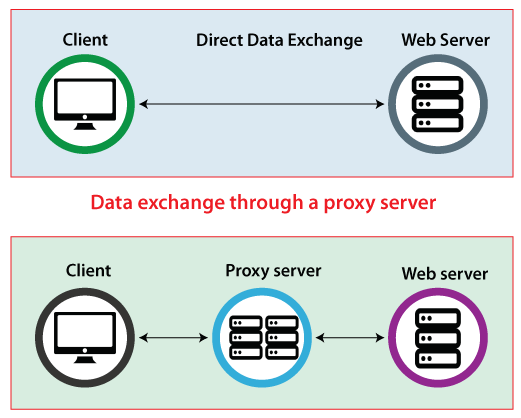
In the first half of the figure, the client is directly accessing the webserver as there is no proxy server in between them. While in the 2nd half, there is a client and the internet, and there is a proxy server between them. Here the client is accessing the internet the same way by using a proxy server. The proxy server will work on behalf of the client. i.e., it will fill the client's request by making a connection with the internet webserver.
Proxy Server Architecture
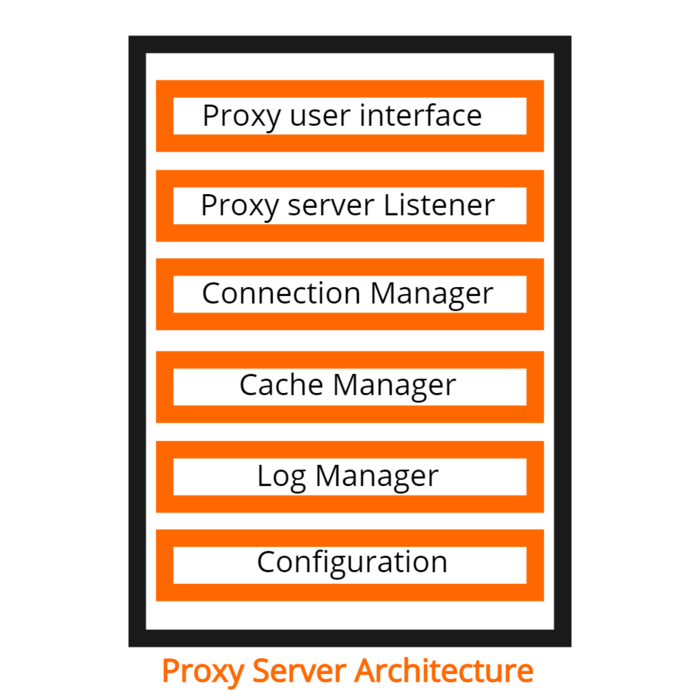
The proxy server architecture contains six modules. Each module has its own task to perform. Let's understand them individually.
- Proxy User Interface
Its function is to control the proxy user interface to make it user-friendly for the client. It presents all the interface units like menu, button, and windows in an easy graphical pattern. For example, a menu like a start proxy, stop proxy, block URL, etc.
- Proxy Server Listener
It listed a new request from the client's browser. This module acts as a queue for coming requests and also responsible for blocking clients from the list given by the user.
- Connection Manager
It is responsible for the main functionality of the proxy server. This functionality includes:
- Taking the request from the client.
- It creates a connection with the server
- Responsible for reading the reply from the server.
- Looks for the requested URL, whether it is blocked or unblocked.
- It also checks whether the requested page is in cache or not.
- Cache Manager
This module is liable for storing, erasing, clearing, and looking for web pages in the cache.
- Log Manager
This module is liable for viewing, clearing, and refreshing the logs.
- Configuration
This module assists with making arrangement settings that allow different modules to perform according to our designs, such as storing (caching).
Proxy Caching In Proxy Server
Proxy caching is a feature of proxy servers that stores content on the proxy server itself. It allows web services to share stored resources with more users who are looking for the same resources. The proxy server coordinates with the source webserver to cache documents such as files, images, web pages, etc.
Let’s understand with diagram,
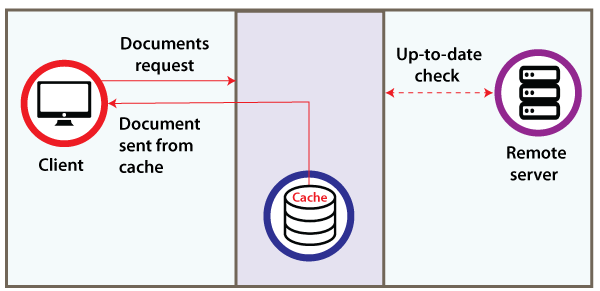
In this diagram, we can see that there is a proxy server between a client and the remote server. The client requests a proxy for the document from the remote server. It is assumed that the same document was accessed earlier by another client. So the copy of that document will reside there in the proxy's cache. First, the proxy searches the document in its catch. If the copy of the document exists, it will be sent to the client by the proxy server without connecting with the remote server.
Need of Proxy Server
Below are few reasons to use the proxy server over the open internet:
- Blocked Website Can Be Accessed: Many countries do not allow their website to be accessed from the IP address of a particular location. So one can also access a blocked website using a proxy server.
- Access to a resource through caching: The proxy server also stores recent requests (in the cache memory) to fulfill the same request faster.
- Enhanced Security: It also provides security, as it does not publish the information(IP) of the client to the webserver.
- Helps in controlling internet usage: Parents and the organization's owner can monitor and control the use of the internet by their children or employees.
- Hides client Identity: The proxy server access the webserver on behalf of the client. As there is no direct interaction of the client with the server, the client's IP will not be known by the webserver.
- Can Be Used As A Corporate Server: Corporate can use the proxy server to block irrelevant websites, and proxy can also track the employee's activity over the internet.
- Proxy is usually free: Although few paid proxies are also available, few are free and do not require you to pay someone to use them.
Types of Proxy Server
A proxy server can be categories into many types. We will discuss the most common out of them here:
- Forward Proxy Server
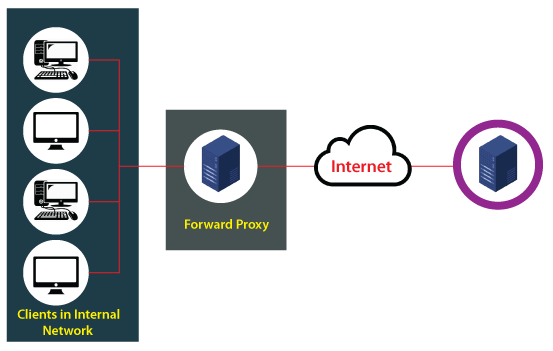
Think about the machine sitting towards the client-side, which communicates to the server on behalf of groups of clients. So the client sends a request to a proxy, then the proxy sends the request to the server, and then collects the data to respond to the client. This concept shows how forward proxy works.
Here the client is never communicating directly to the server because it does by proxy on behalf of the client. So the server doesn't know the client's IP; it only knows the proxy's IP.
Reverse Proxy Server
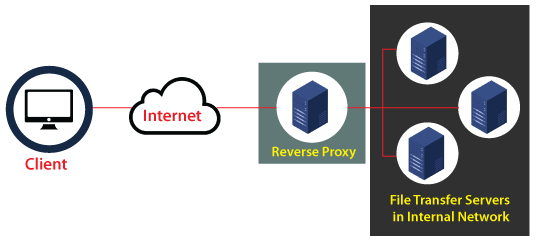
Suppose the proxy server sits towards the server-side and acts as a middle man for all the servers. It is called the reverse proxy. Here clients talk to the proxy, the proxy server communicates to all the servers and responds to the client. In this case, servers are anonymous, and the client doesn't know about the IP addresses of any of the servers. It only knows about the proxy IP.
- Shared Proxy: In a shared proxy, the same IP address is used by many clients simultaneously for request. An IP address is shared among multiple users so that it may work slowly, but it’s an ideal choice for those who do not want to spend more on the faster connection. It may be less secure, as other's mischievous activity can blame one due to shared IP.
- Public proxy: Public proxy, as the name suggests, it is public(open) for all and available free of cost. It can be a good choice if someone is looking for the free proxy over security and speed. Using public proxy may be risky because others can access information on the internet.
- Caching Proxy Server: The caching proxy server responds to the client's request from its cache with the saved contents from previous requests without communicating with the specified server. It makes the whole process faster.
- Distorting Proxy: It introduces itself as a proxy to a web server but with a false IP address. It is perfect for the client who does not want to disclose their location.
- Split Proxy Server: The proxy servers implemented over two or more computers come under this proxy server.
- Residential Proxy: Internet Service Provider (ISP) provides an IP address to a residential proxy with a physical location. All the client's requests go through that server. It is also an ideal choice for the client who wishes to verify the ads on the website coming from different sources, and we can also block the suspicious ad coming from different competitors. Residential proxy is more reliable while comparing it with others.
- SSL Proxy Server: Secure socket layer (SSL) proxy performs encryption and decryption between the client and the server. It means no one can detect them, neither server nor client. It ensures data transmission using the encryption method. It also enforces clients and servers to use solid protocols and algorithms.
- Rotating proxy: In this rotating proxy, every request that the proxy gets from the client is sent to the target server by assigning them a unique IP address. In simple words, we can say, with every request, there is a separate IP address.
- Anonymous proxies: Anonymous proxy is a proxy that hides the client IP but presents itself as a proxy to the webserver.
- High Anonymity Proxy: High anonymity proxy, one of the secure proxies to use. Like an anonymous proxy, it does not hide only client identity to the webserver but also hides its identity and presents itself as a client before the webserver. The chance of getting traced is nearly impossible while using this proxy server.
- HTTP proxy server: The HTTP proxy server can save lots of bandwidth as it compresses the web traffic, caching files, and pages coming from the sites, and it also reduces the number of ads that reach our computer's browser. HTTP proxy also allows lots of clients to utilize the connection simultaneously, making it more useful for the organization having large numbers of employees.
Working of Proxy Server
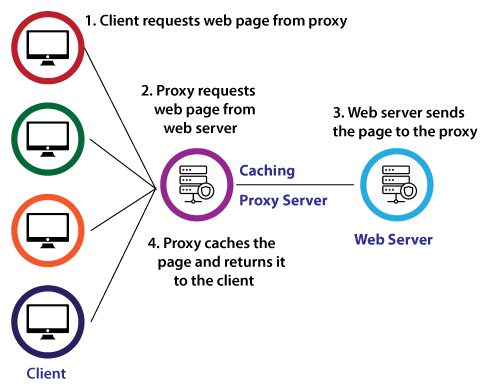
Let's understand the working of proxy in few steps considering the above figure.
- Consider yourself as a client, and you want to access any webpage. Then, you will request the proxy server's IP for the same using your IP.
- After getting the request from a client, the proxy server will request further to the webserver for a particular webpage using his IP address.
- The web server will receive the request from the proxy server, and to fulfill the request, it will respond to the proxy server's IP with the requested page.
- Finally, the proxy server will keep(in its cache) the copy of that webpage and further respond to it to the client, and he will get access to the webpage without getting directly involved.
An important point from the above example:
- While using a proxy server, the client can't directly interact with the webserver.
- The IP address of the client will be unknown to the webserver as there was no direct interaction between them.
- As proxy keeps the copy of the recent request to access the same request from there only.
Note: All the IPSec protocols and Data packets encryption/decryption are integral parts of the computer network. In the above steps, wherever it requires, will be applied.
Advantages of Proxy Server
The following are the advantages of a proxy server:
- Makes Client Anonymous Online
People use the proxy server to hide their identity by not allowing themselves to interact directly with the requested server. On behalf of the client, the proxy uses its IP address that masks up the client's IP. It keeps the client safe from the hacker as they are not traceable anymore.
- Proxy Provides Extra Layered Protection
Nowadays, many websites contain malicious code in the form of phishing links, viruses, and malware. And proxy server allows us to block those websites. An organization can utilize the proxy server for the same so that the employee can't be allowed to access unauthorized services that may lead one to be in trouble.
- Allows To Unblock Restricted Content
Many countries or institutions do not allow their content to be accessed from different locations. It becomes almost impossible to access those content. Still, thanks to the proxy server that acts as an intermediary and masks up the client's IP while approaching the targeted website that allows clients to access the restricted content. Many organizations block access to social media for their employees, but a proxy server may help them to access those websites.
- Page loading speed is faster
Earlier, we have discussed the concept of proxy caching in the proxy server, so when it comes to the speed of the proxy server, it is entirely dependent on the same concept. The only concern is that the cache-store only the previously accessed web pages, and it guarantees the speed for accessing those pages only as proxy does not have to go again to that website for the request. Although it will give access from its cache, it may be changed to get the outdated version of what you are looking for.
Disadvantages of the proxy server
The following are the disadvantages of proxy server:
- Connection May Not Be Encrypted
However, a Proxy server provides a high level of anonymity. Still, it does not encrypt the connection and can cause a significant issue if we look for an encrypted connection throughout the communication. Some proxies like SSL(Secure Socket Layer) provide an encrypted connection, but somehow they are not secure enough to prevent today's attack.
- Proxy Provider Can Track User's Activity
Although a proxy server makes you anonymous by mask up to your public IP address, some proxy providers may see your activity over the internet. It's a handy tool for the organization to keep track of the employee activity but can't be secure all the time, especially for individual and personal use. So before going for any proxy services, it can be a good practice to know about the proxy server and its provider.
- Setup Cost
A secure and handy proxy server can be costly in terms of setup and maintenance. However, larger organizations can bear the expenses, but it will be difficult for small businesses.
Proxy Server vs. VPN
Whenever it comes to access websites by changing the IP addresses or accessing the blocked website, we have one more famous alternative for that, i.e., VPN(Virtual Private Network).
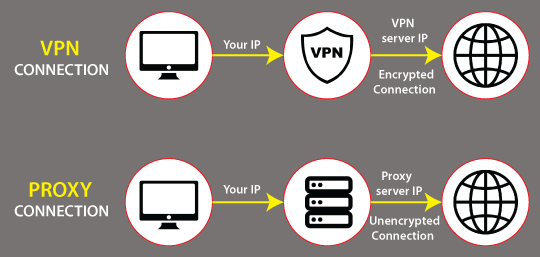
VPN has almost similar tasks to perform even though there are few differences between them. Let's discuss them in tabular form.
| Index | Proxy Server | VPN(Virtual Private Network) |
| 1 | Less secure as it does not encrypts the traffic. | It encrypts the traffic that makes it more secure. |
| 2 | The IP address of the client is hidden. Still, the proxy owner can see it. | An IP address is completely hidden. |
| 3 | Speed depends upon the proxy server and its cache. | It provides maximum speed. |
| 4 | Its works for the particular application where the proxy server is active. | It works for all the applications of the system where it is logged in. |
| 5 | It is mostly free. | VPN is chargeable. |
| 6 | Useful for business purposes for large-data gathering. | Used mainly by the individual for personal uses. |
| 7 | Proxy server connection may frequently drop. | VPN connection is more reliable in comparison to the proxy. |
| 8 | Due to security issues, it is not treated well for torrenting. | Yes, it's a good choice for torrenting. |
| 9 | To use the proxy, someone needs to be expertise. | VPNs are easy to use. |
| 10 | Proxy server uses proxy caching concept. | VPN does not support such a facility. |